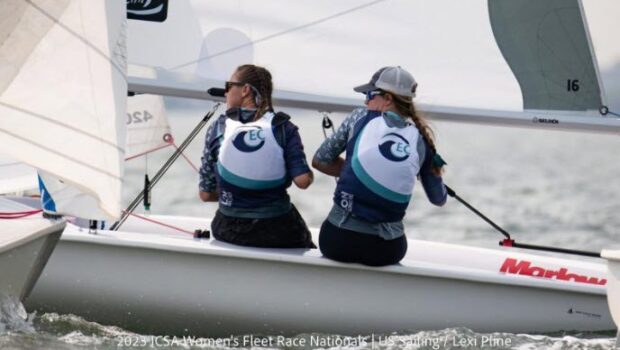Insights into college sailing recruiting
Published on March 7th, 2024
Inter-Collegiate Sailing Association President Greg Wilkinson shares his insight and perspective on the college sailing recruitment process with Ty Christopher Olsen in this exclusive interview for Zig Sailing Insider, a membership service which provides regatta logistics.
Can you give us a little bit of background about yourself, sailing and coaching prior to Boston College and the Inter-Collegiate Sailing Association (ICSA)?
Well, I started coaching college sailing in the spring of 1996 at the University of Vermont (UVM). In 2002, I accepted an offer to coach at Boston College. I was lucky to inherit a good team with amazing growth opportunities. We had some growing pains in the beginning, and we did not win at the highest-level right off the start, but we finally won our first National Championship in 2008. We have won 22 National titles since then.
Ever since I became a college sailing coach, I have been involved with the leadership of college sailing, both on the Conference and National level. In July 2023, I was named the President of ICSA. I am still getting my feet wet with the position, but I am excited for the opportunity to oversee an organization that supports such an amazing college sport.
Regarding the ICSA, can you give a quick over view of what your position as President entails?
Sure, as the President of the ICSA, I oversee the board which is made up of a graduate and undergraduate sailor from each of our conferences and the officers of the board, including the vice president, treasurer, and secretary. I also work directly with college sailing’s executive committee assisting in carrying out the day-to-day operations. The board sets policy, the executive committee monitors the daily operations, and the president oversees both entities.
There’s a lot of discussion about recruiting in college sailing – for the purposes of this article, how are you defining recruiting?
Teams might recruit sailors at campus activity events or through current team members. Other teams will recruit during the college application process. For the purposes of this interview, I see a recruit as a sailor who is getting official help in the admissions process based on their sailing ability – much like a recruit in a sport like football.
What does it mean when an athlete “gets help” from admissions?
It means that an official policy is in place between athletics and admissions where athletic ability has some direct impact on an admissions decision. Coaches designate which applicants have been identified as being worthy of the benefit of having this direct impact on admissions. The policy limits the number of applicants a coach can designate, and these limits are generally very low on an annual basis. It is not possible to define exactly “how much” direct impact athletic ability can have on admissions decisions.
I think the best way to look at it is this:
The most competitive schools in the country from an admissions standpoint can talk about the fact that many applicants with perfect grades and perfect test scores get rejected. But, the reality is that many applicants with perfect grades and scores get admitted as well – so, by definition, perfect tests and scores are admissible. The reason two applicants with identical scores and grades can have a different admission outcome is that the process is competitive – the entire application is read against other applications, not just statistics. But, in a recruiting situation, where a coach is supporting an application, that admissible student will likely not get rejected.
Although that scenario is about the most competitive schools, it’s just an example and I think it applies generally as you move through the “competitive bands” of schools. Coaches’ support typically protects another wise admissible student (who might get rejected in the competitive process) from rejection.
Another way to look at it is that there are very few rabbits being pulled from hats – B students aren’t getting into schools where nearly all the admitted applicants have straight As.
In college sailing, does an athlete need to be recruited, or do colleges allow for “walk-ons”?
One of the biggest misconceptions is that a sailor must be recruited to participate in college sailing, and that is really just not true. Most college sailing programs allow for people with sailing backgrounds to try out for the team. I think that the “walk-on” success rate in sailing is higher than almost any other college sport. The chance of being a walk-on is high because most college sailing programs are not able to fill their rosters with recruited sailors. Also, typically fewer people on campus have played our sport in comparison to other sports.
So, if you are not recruited, you may still be able to race at the highest level of college sailing?
Absolutely. As universities and colleges have made their programs more professional, the perception in the youth sailing circles seems to be that there is limited opportunity to sail in college.
It’s strange, I think that college sailing has gained the reputation of being sort of an exclusive sport and that it is hard to break into college sailing. This is not true. Sailing as a collegiate sport versus, for lack of a better word, mainstream collegiate sports, is incredibly accessible. There are some wonderful examples of students with limited sailing experience who become highly successful college racers. Some have even made sailing into a successful career post-college.
What are coaches looking for when recruiting a sailor?
Qualifications for college sailing recruitment vary among programs and schools. Typically, coaches are looking for sailors who can help their teams win at the highest level: Talented sailors with a proven [winning] track record; team players; high level athletes. Excelling in multiple sports could be important, as it shows athleticism and a winning mindset. Coaches also reach out to high school and youth coaches for their recommendations.
It’s important to understand that some coaches also have very specific needs based on graduation, up and coming members of their current squad, etc. For example, a team might be graduating their top two women’s skippers; therefore, they need to recruit more women; or a team could have a skipper/crew imbalance and may need to recruit more crews than usual. When talking to a coach, I would recommend asking questions about what the team’s needs are for a given recruiting class.
Do you recruit sailors from specific fleets?
We have seen college coaches recruit sailors from a variety of different classes and fleets. It doesn’t matter what type of boat the person sails. My advice would be to seek out the most competitive sailing opportunities you possibly can and maximize those opportunities.
Are sailors ever recruited who sail high performance boats, like catamarans?
Yes. Again, the type of boat doesn’t matter.
Do you have to be a skipper to be recruited? Do college coaches ever recruit crews?
The honest answer is yes, some colleges recruit crews, but not as often as skippers. This is another reason to ask a coach what they are looking for in recruits. In some years, a coach might be looking to recruit two crews, in another year that same coach may not be able to recruit any crews and may need to rely on sailors who get admitted without recruiting help to fulfill the teams needs in terms of crews.
What advice would you give to a high school sailor interested in sailing in college?
About 185 schools in the US have college sailing teams, ranging from club to varsity sports.
I always recommend that high school students interested in college sailing should begin with a general search. They need to look at each school as a whole entity, just like any other college applicant. Factors to think about include academic fit, areas of study, location, size of school, urban vs. rural communities, etc. After they narrow the list down, then they should look at where sailing fits in. I guarantee that students can find a college which meets their general requirements and has a college sailing team.
If a sailor wants to attend a specific school with a sailing team, should that sailor contact the coach if so, when?
Definitely, sailor athletes should contact the coach or sailing team leadership via email. A good time to do that would be the summer before a student’s junior year of high school. At that time students have completed two years of high school and are starting to look at colleges and universities.
When a sailor reaches out to a college coach in hopes of being recruited, what type of information should they give to the coach?
The absolute most important thing to send to the college coach upon initial contact is your academic transcript. Without sending a transcript, a coach can’t determine if you are an eligible candidate for the school. Funny enough, this is the one thing that I get less than 50% of the time from athletes when they contact me. Potential recruits need to understand that admission to college is dependent first on the applicant’s academic record. Submitting sailing and athletic results and accomplishments comes next. Most coaches will want to hear about any other sports that the athlete has participated in. We are looking for well-rounded athletes.
What questions should potential team members ask a coach?
A great question for potential recruits would be: “What does your team require of team members?” The expectations for team members vary based on whether the team is categorized as a club sport or a varsity sport, and naturally, each coach implements their own approach in managing the team. Prospective recruits should ask college coaches about the specific commitments, such as participating in workouts, attending team meetings, getting involved in fundraising activities, or allocating time for study hall. The requirements can differ significantly. Nevertheless, a consistent aspect is the regular practice schedule, usually 3-4 times per week, along with weekend regatta competitions.
On average, how many sailors reach out to you on a given year?
Well, if you count emails and people reaching out more directly, it’s an extremely high number. It is a very difficult to keep up with the number of inquiries, but it is hundreds. That total is only counting the ones that follow the process properly, with academics, athleticism, etc.
Are there times that you become aware of an up-and-coming sailor that may be a good addition to your program and reach out to them directly?
Yes, it does happen that colleges will reach out to athletes directly, but it is usually a small percentage.
After the initial contact between coach and the athlete, what are the next steps?
Hopefully early in the connection the coach will have an academic record, from there it is going to vary widely from school to school. Someone will make an estimation of the student athlete’s chances of admission. At some schools, the admissions department helps determine the likelihood of an applicant’s admission based on the academic record. At other schools the coach might be looking at the transcripts and offering their own opinion.
Shortly thereafter, the coach will make sure that they are intimately familiar with the sailor ’s background. Most coaches recruit based on the current needs for their team. It could be they are looking for a smaller body type, crew only, skippers, males, females, etc. Then dependent on the sailors’ projected ability and projected admissibility, then the coach will likely have discussions with the sailor about visiting the school and seeing how truly serious they are about attending the school.
Is the recruiting process different at an Ivy League school as opposed to a State College or University?
It’s not tremendously different. Ivy League schools are very competitive to get into. There is something out there called a likely letter, that started at Ivy League schools some time ago, and now other schools have adopted the likely letter program. The likely letter is a letter that a highly sought-after recruit may be able to receive prior to receiving an admissions decision. Admissions has a set of dates they need to follow in advising students of their admission status. Highly sought-after athletes may receive a likely letter before the admissions dates. The letter is usually from the athletic department, admissions department or a combination of both indicating that the college has reviewed the applicant’s academics, and it is highly likely the student will receive admission. The letter usually also indicates that the school is excited about the prospect of the applicant attending their college and competing for the sailing team.
One thing that you never hear about regarding college sailing, is students being offered scholarships. Are there scholarships available for sailors?
There are no scholarships available for any collegiate sailing teams. The ICSA is the nationally governing body for college sailing. Sailing is not governed by the NCAA, it is governed by the ICSA, the board that I oversee. One of the rules that was set in place since college sailing was founded, is that there will be no scholarships for sailing. ICSA has kept this policy to hopefully avoid the, so to speak, “haves and the have nots.” So, a school with deep pockets that can afford scholarships and can offer them to the higher talent, as opposed to some other schools that do not have the ability to do that. We are trying to maintain a competitive balance where possible.
In guiding parents and sailors through the recruitment process and helping them get ready, what advice do you have?
Parents and sailors need to have correct expectations. The idea that sailing is going to help your child get into college is VERY overinflated. It is something that I hear about time again in the youth sailing circles. In all honesty, the vast percentage of sailors in the country, even the very talented sailors, are not going to get admissions help. It is an extremely small percentage per year.
Again, when thinking about recruitment, it is important to think beyond sailing. It is important for everyone to think; is the schoolwork a good fit? Is the teamwork a good fit? It is all so important. I meet with a lot of families who I think have the understanding that the college admissions have become more of a stressful experience for people and one they think that they must win at, but it really is not like that. To repeat, students and athletes are going to get into a school under their own merits in both athletics and academics, VERY few will get any assistance with the admissions process. I think that a lot of athletes believe that sailing is going to help them get into college. The truth is that sailing will help only a small amount of people get into college.
Greg, we are about to wrap up here, but before we do that, do you have any final thoughts that you’d like to share for those interested in exploring college sailing?
The biggest message from me is that college sailing is extremely accessible. You do not need to be recruited to sail in college. There are collegiate sailing opportunities for the vast majority of youth sailors who want to participate. That opportunity might not be a starting spot on a roster that won last year ’s National Championship. However, those passionate about sailing can likely find a school where they can compete and contribute. There are some people that find their way into collegiate sailing without even doing it prior to college. Sailing is not an exclusive collegiate sport, it’s just the opposite.
Thank you to Zig Travel for sharing this report. To learn more about this service, click here.










 We’ll keep your information safe.
We’ll keep your information safe.